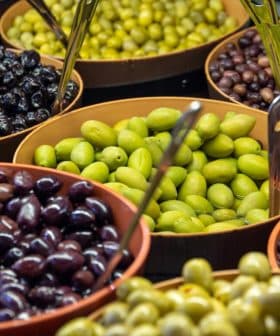Record-High Olive Oil Exports Projected in Turkey

Turkey is expected to hit a record-high of 134,000 tons of olive oil exports this crop year, almost three times higher than last year’s exports, due to a steep drop in global olive oil production. Despite some challenges in foreign markets, producers and exporters in Turkey are optimistic about the increase in exports, attributing it to competitive prices, increased brand awareness, and growing global demand for healthy food.
Following an unprecedented harvest of more than 420,000 tons of olive oil in Turkey, preliminary estimates by the International Olive Council indicate that the country’s exports will hit a record-high 134,000 tons this crop year.
The figure represents an almost three-fold increase in Turkey’s olive oil exports compared to last year when shipments from the country amounted to 58,000 tons.
This is a year of great opportunity. We can increase both our exports and business consumption.
Mustafa Tan, the chairman of the board of Turkey’s National Olive and Olive Oil Council (UZZK), confirmed the IOC’s export figure, ascribing part of the increase to the steep drop in global olive oil production.
“It is determined that these figures will be realized with a high degree of accuracy in the current year,” Tan told Olive Oil Times. “Of course, there may be some updates due to the earthquake zone. But this year, Turkey will increase its olive oil and olive exports in every way. This is also very closely related to the lack of supply in the world.”
See Also:Turkish Parliament Stops Coal Mining Operations in Olive Groves“Turkey continues its production and marketing activities related to olive cultivation despite the earthquake disaster we are currently experiencing,” he added. “The country will recover from this difficult process with government measures and the selfless efforts and contribution of the people.”
Producers and exporters in Turkey attributed the expected record-high exports to several factors, including the gap in the global olive oil market that remains to be filled.
”In 2022/23, the opportunity for Turkey has come from the lowered production in Spain,” Can Candeger, a managing partner at Artem Oliva, one of Turkey’s largest olive oil producing and exporting companies, told Olive Oil Times.
“This situation has created a double advantage for the Turkish olive oil industry, ” he added. “We are in line with the IOC’s projection of around 130,000 to 140,000 tons of olive oil exports this season. The reason for our expectations being higher than the linear increase compared to the production trend is mainly because of the additional competitive advantage Turkey has gained.”
Candeger cited the competitive prices, the increased awareness of Turkish olive oil brands and the proven track record of high-quality production as the reasons for the increase in exports in recent years.
“This situation has shaped the supply side of Turkish olive oil, which means that new brands entering the market are also showing a greatly increasing trend,” he added.
Candeger further noted that the growing global appetite for healthy food helps boost exports of Turkish olive oil.
“There is an increasing demand for olive oil not only from consumers but also from companies that use it as an ingredient in their food production lines,” he said. “The main factor behind this is the healthy eating trend.”
“According to the IOC, as of 2022, this is the first time that such a trend has been observed over three consecutive crop years, let alone during two years of the Covid-19 pandemic,” Candeger added.
Davut Er, the president of the Aegean Exporters’ Associations (EIB), emphasized that Europe should turn to Turkish olive oil this season, citing Spain’s poor harvest.
“The European Union needs Turkish olive oil, so it has to focus on alternative markets,” Er said. “The developments in the world olive oil market favor Turkey.”
Others, however, argued that significant hindrances exist in foreign markets for Turkish olive oil, asserting that any significant export growth should primarily benefit the country’s olive growers.
“I do not believe statistics made by some prevision,” Cem Erdilek, the general manager of award-winning Darvari Gida Tarim from Çanakkale in the northwest of Turkey, told Olive Oil Times.
“Statistics show millions and millions in earnings, but these do not go to the farmers’ pockets,” he added. “The problem for Turkish exporters is the global economic crisis.”
Erdilek also noted that a shift in Darvari’s export strategy was required to avoid dealing with existing trade barriers in the E.U.
“We have to pay an extra tax of €1.10 per liter of olive oil exported to the European Union,” he said. “This is a big problem for our pricing. For this reason, our main focus of exports is now East Asia and the Middle East.”
“We have [in Turkey] this amount of olive oil, but I am not certain we can achieve the projected export quantities due to the tight market restrictions all over the world,” Cem added. “I hope, however, we can succeed in exporting it and share the profit with our growers who need to balance their income.”
On the other hand, Tan had previously urged Turkish authorities to refrain from imposing any limitations on the exports of Turkish olive oil this year.
“This is a year of great opportunity,” he said. “We can increase both our exports and business consumption. There are all kinds of possibilities for this. No decision should be taken to restrict our exports. Our government should support the producers more than ever in the face of rising costs.”
A ban on bulk olive oil exports was imposed in Turkey in 2021 and 2022 to address market imbalances and rising prices. However, industry experts and exporters’ associations disputed the necessity of the export bans.









